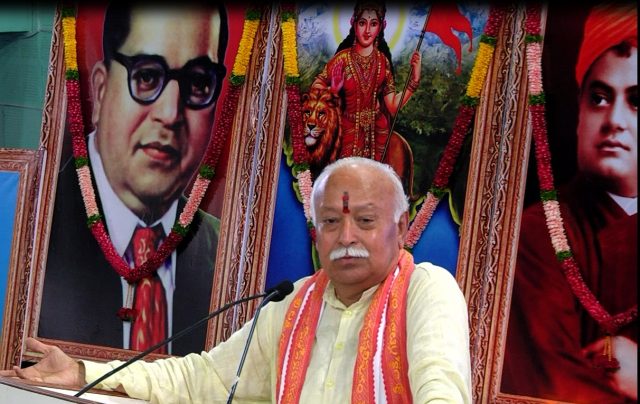
The Constitution of India is the lengthiest constitution in the world and we make this assertion as a matter of pride. It is no doubt one of the better-drafted and certainly more detailed constitutions. However, this should not prevent us in striving for the betterment of it.
Recently, RSS chief Mohan Bhagwat remarked, “Our Constitution was written based on the understanding of the ‘Bharatiya’ ethos of our founding fathers, but many of the laws that we are still using are based on foreign sources and were made as per their thinking. Seven decades have passed since our Independence… this is something we must address.” He added, “I recently asked Pranab Mukherjee about the definition of legality. He said morality is legality. Then I asked him is the vice versa true?”
What Bhagwat pointed out has raised fundamental questions of Jurisprudence. It is pertinent to highlight that Indian Constitution is 80 percent in spirit what the Government of India Act, 1935 was. Most of the provisions found in our Constitution reflect a parallel provision in the Government of India Act, 1935. This argument is in no way to discount the efforts of the Indian Constituent Assembly and the framers of our Constitution.
The members of the then Constitution Assembly and the drafting committee, specifically, were visionaries of the highest order and put an enormous amount of time and effort to debate and discuss each prospective provision before incorporating it in the Constitution. The Constitution of India was, in fact, one of the most progressive documents of that time, especially because of the breadth of rights it guaranteed in one go.
The Government of India Act, 1935 at that time was virtually the most important legislation of British India. It was also the single largest legislation of the British Parliament, at the time of its enactment. It is important to note that no matter how important and relevant this legislation was to the governance of India, it was a legislation of the British Parliament. Therefore, it is only natural that it will reflect the values of the British people and their society. It is no secret that the framing of laws in British India was, according to the British interests and not Indian.
A debate on the betterment of our Constitution and the legal system as a whole is not only welcome but is also essential in today’s context. In furtherance of this, the government in 2000 had set up the National Commission to Review the Working of the Constitution (NCRWC). The commission submitted its report in 2002, but since then they are lying dormant and successive governments have not taken any initiative to implement the same.
Most of the recommendations of the NCRWC were, in fact, to further the spirit of our Constitution in itself. For instance, several important rights are not there explicitly in the text of our Constitution but have to be implied through various judgments of the Supreme Court. The NCRWC suggested that such rights, like the Right to Employment for 80 days, Right to Privacy, Right to Press, Right to Life with Dignity and Right to Compensation from the State in case of violation of the Right to Life or Liberty. All of the above are certainly forward looking progressive rights which the Indian Constitution should have in its letter. These are also reflective of the changing society and the norms.
There are other important laws too, which have British origins but are still applicable in the same vigour. For instance, the Indian Penal Code is the classical example of enforcement of British morality of 1860. Acts which were wrong as per the British society of 1860 have been made crimes. These may not be relevant in India of 2017. A lot needs to be done to reform the criminal justice system itself. Hardly any recommendations of the Malimath Committee, which was constituted in 2003, to suggest reforms in the Criminal Justice System of India, were implemented.
According to Friedrich Karl von Savigny, the famous jurist of the historical school of jurisprudence, the most important source for Law is the customs prevalent in the society. He remarked, “Laws, too, must be adapted to the spirit of each nation, for rules applied to one nation are not valid for another. The only legitimate governments are those that develop naturally among particular nations and reflect, in their differences from other policies, the cultures of the people they govern.”
He was of the opinion that law grows like a language and each nation will, therefore, grow its own unique legal system. This means that changing times, certainly invite changes in the legal system of any country as per the traditions and customs of that society and nation. Savigny was opposed to the idea of codification ie enactment of the law in written form through legislation.
He said that codification leads to stagnation of the growth of law. Sadly, in the case of India, such codification happened during the British rule, and we are bound by the morals and value system of that time.
In India, thus, the law couldn’t grow beyond that point in time. It is therefore very important that there are periodic amendments to most major laws, including the Constitution.
Hence, Bhagwat’s assertion that a reform of the Indian legal system, to incorporate the ‘Bharatiya’ ethos is absolutely in line with the established jurisprudential notions of law making. His assertion is very much akin to that of Savigny, as both speak of the adoption of the laws as per the spirit of the nation. His comments should be taken in the right spirit, and should also be acted upon by the government of the day. It is high time anyway that the legal system of the country undergoes a major reform.
By Raghav Pandey
The author is research fellow with the Department of Humanities and Social Sciences, IIT Bombay, Mumbai. He can be reached at [email protected]
Courtesy: Firstpost














